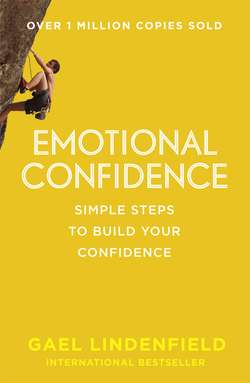Читать книгу Emotional Confidence: Simple Steps to Build Your Confidence - Gael Lindenfield, Gael Lindenfield - Страница 22
Instant Exercise
ОглавлениеAs you are reading each of the following sections, try to add an example from your own experience.
| The most dominant emotional memories are the ones which aroused the most feeling at the time they were recorded in the brain. |
This means that events which in the past have given us (or our ancestors!) the biggest scare or biggest thrill are highlighted in our emotional brain. They will be the first memories to be spotted during the emergency scanning process – even though they may have no direct relevance for the current situation.
The fast approach of a large crowd of people into a hall or lift or onto a station platform may reactivate emotional associations with being lost in a busy super-market as a young child – or with the stampede of an army that threatened one of our ancestors!
| The earlier in life that memories are imprinted, the more likely they are to become permanent rapid-action blueprints which will be applied in stressful situations throughout our lives. The very latest methods of photographing the brain have apparently revealed that highly emotionally-charged experiences (such as child abuse) actually make a physical impact on the brain’ neural structure. |
This means that under stress we are more likely to respond automatically with behaviour learned in childhood when we experienced similar emotions.
A normally assertive parent may find him- or herself inappropriately obsequious and passive in the face of a child’s critical teacher.
| Trauma in adulthood can also imprint emergency responses into our brains. This has now been given the label ‘post-traumatic stress disorder’ (PTSD). Research has confirmed that when a major trauma is experienced, new neural emergency circuits are sometimes set up. |
This means that the pituitary glands of people suffering from PTSD are constantly over-worked and that it is much more difficult for them to reach a state of relaxation.
Survivors of major disasters will often find themselves responding to minor emotional problems many years after the event as though these were major emergencies, and will find it very difficult to control their anxiety responses. This behaviour often makes it difficult for them to hold down a job or maintain relationships.
| When feelings are running deep, the emergency fight/flight/freeze centre is set off. The action it initiates can only be either aggressive or passive. |
This means that it is extremely difficult to be assertive or maintain a win/win approach when our emotions are highly aroused.
A normally shrewd manager could become unwisely impatient if his or her anger is aroused during a negotiation process.
| The fight/flight/freeze response cannot produce new ideas or adapt to new applications and new situations. It therefore often prompts out-of-date or inappropriate responses. |
This means that even the most confident, capable and creative adults often respond predictably when they perceive themselves to be threatened.
A medium-sized parent may impose unenforceable restrictions on a rebellious large-sized teenager as though their relationship had backtracked 10 years.
| Our fight/flight/freeze centre can initiate action much more quickly than our thinking brain. Its instructions to the other parts of the brain to produce the necessary chemical formulae and set in action appropriate motor responses are sent in a matter of milliseconds. |
This means that, although evolution has provided us with thinking centres which can control feeling responses. They are much slower off the mark than our primitive fight/flight/freeze response.
At the sound of a sudden loud crash we can find ourselves shouting (maybe just like our parents or teachers) at an innocent child who tripped and accidentally pulled the table-cloth when we would have preferred to respond in a more nurturing fashion.
| After a ‘silly’, inappropriate fight, flight or freeze response, our thinking brain centres try to make sense of what has happened. |
This means that we automatically start to rationalize our behaviour as soon as we are aware that we have made an emotional mistake.
Attributing the blame for our own embarrassing and regrettable outburst to someone else’s ‘impossible personality’ or the ‘state of the kitchen’.
